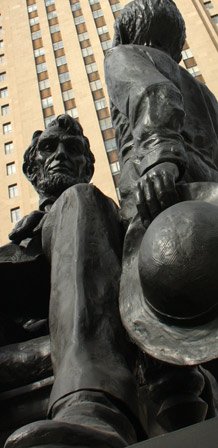Mayor Sly James said today that legislation introduced on Tuesday regarding the Kansas City earnings tax reveals a significant misunderstanding of the U.S. Constitution and a recent Supreme Court ruling.
“The Kansas City earnings tax has been a constitutional financing method of Kansas City for half a century, and a recent Supreme Court ruling regarding a Maryland tax does not affect our earnings tax,” James said. “Civic and business leaders agree that the earnings tax is a sound and fundamental way for Kansas City to finance City services.”
Missouri State Sen. Kurt Schaefer said in a news release on Tuesday that the Missouri law authorizing Kansas City and St. Louis to levy the earnings tax is “clearly unconstitutional” and “in direct violation of the Commerce Clause of the United States Constitution.”
In May, the United States Supreme Court held in Maryland State Comptroller of the Treasury v. Wynne that a tax in Baltimore, Maryland, was unconstitutional, finding that it improperly penalized interstate commerce.
But the earnings tax imposed in Kansas City is not similar to the tax structure struck down in the Wynne Supreme Court case.
The Supreme Court said Maryland’s income tax system did not grant a full credit to residents who also pay income taxes in states where they work. Kansas City allows residents a credit for local earnings tax paid to other cities, meaning the Supreme Court case has no direct impact on Kansas City, James said.
Key civic and business leaders in Kansas City have long supported the earnings tax, and they reiterated that support today.
“The earnings tax is a critical component of a balanced set of revenues that funds basic City services relied upon by the business community as well as individual citizens,” said John Sherman, Chair of the Civic Council of Greater Kansas City. “The Civic Council supported the campaign to retain the earnings tax in 2011, when its renewal was overwhelmingly approved by the voters. We continue to view its retention as essential for Kansas City’s continued progress.
Sherman added: “The voters of Kansas City will again be asked in April 2016, as required by State law, whether they want to retain the earnings tax for another five years. We believe decisions about the earnings tax should be a local matter, decided by the voters who are most knowledgeable about the kind of community they want to live in and how best to pay for the services used daily by residents, people who commute into Kansas City from across the region to work, and visitors.”
The Greater Kansas City Chamber of Commerce also opposes Schaefer’s move, said Jim Heeter, chamber president.
“Sen. Schaefer’s action is wrong-headed and mean-spirited,” Heeter said. “In 2011, Kansas City, Missouri voters renewed the e-tax by a vote of more than three-to-one. It represents a significant portion of the City’s revenue stream, with half paid by people living outside of Kansas City, Missouri. Killing the e-tax would have a devastating effect on the City’s ability to provide basic services.
“The Kansas City Chamber and the business community strongly supported the renewal of the earnings tax in 2011,” Heeter said. “We will do so again in 2016. We’ll also work in Jefferson City to defeat Sen. Schaefer’s damaging legislation.”
James said the earnings tax is an essential and fundamentally sound tax policy, generating more than $230 million annually. The earning tax provides about 40 percent of the City’s general fund, most of which pays the salaries of the City’s firefighters and police officers as well as public safety services that are shared throughout the metropolitan area.
“The earnings tax has been overwhelmingly supported by Kansas Citians, as evidenced in the results of the 2011 election,” James said. “Citizens also have given high marks to the City in delivery of services, suggesting that the earnings tax functions well, as it has for 50 years. We will be vigorously fighting this legislation in January.”















